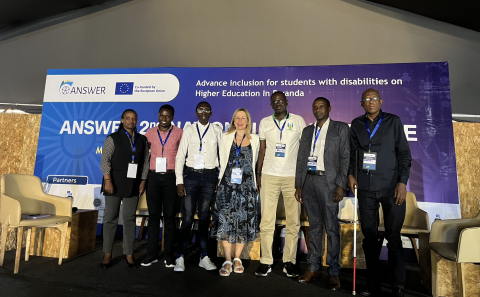
Kigali, Rwanda – 12 September 2025
Venue: Kigali Conference and Exhibition Village (KCEV)
The ANSWER Project 2nd National Conference, titled “Moving Forward an Inclusive Higher Education in Rwanda”, brought together 76 participants, including 8 people with disabilities, representing policymakers, higher education personnel, NGOs, private sector actors, and other stakeholders to discuss the advancement of disability inclusion in Rwanda’s higher education system.
Objectives
- To present the ANSWER Project (Advance Inclusion for Students with Disabilities in Higher Education in Rwanda), its main results, and impact.
- To promote active collaboration and networking between policymakers, educators, NGOs, and relevant stakeholders.
- To foster discussion on implementing inclusive higher education through two focused round tables.
Welcome and Opening Remarks
On behalf of the University of Rwanda Vice-Chancellor, Prof. Florien Nsanganwimana, Principal of the College of Education and lead implementing college, highlighted the impressive results of the ANSWER Project. He emphasized that the project embodies the university’s commitment to creating a more inclusive, equitable, and just academic community.
Regarding the European Commission’s support, he noted that it represents not only financial backing but also a strong signal of trust and recognition that inclusion is essential for humanity’s future. Prof. Nsanganwimana praised the leadership of the University of Alicante, stating:
“With the ANSWER Project, the UR College of Education has become an upgrade of its former self. Inclusion is not just a policy goal — it is a moral responsibility. It means listening to voices that have long been marginalized, recognizing the strengths in our differences, and ensuring that every individual can participate fully in social, economic, and cultural life.”
He also highlighted that the 2023–2026 phase is the first stage of a longer-term initiative, emphasizing the importance of sustainability and continued impact.
Keynote Speech
The keynote address, “Disability, Dignity, and Representation: From Awareness to Action”, was delivered by Hon. Mbabazi Olivia, Member of Parliament and People with Disability Representative of Rwanda.
Hon. Mbabazi underscored the shift in discourse from pity and charity towards human rights, dignity, and inclusion. She referenced international frameworks such as the United Nations Convention on the Rights of Persons with Disabilities (CRPD), emphasizing their implementation at national and local levels. She commended the ANSWER Project’s achievements since 2023 and thanked the Erasmus+ Programme of the European Union for funding this initiative, calling for continued dissemination and sustainability of its results.
Round Tables
Round Table 1 – Challenges & Opportunities of the Student Support Centres
Moderated by Noelia Lopez, the discussion identified several challenges:
- Limited budgets for assistive technologies, accessible learning materials, and specialized staff.
- Physical accessibility barriers across lecture halls, libraries, and accommodations.
- Shortage of trained professionals, including sign language interpreters, braille transcribers, disability counsellors, and ICT accessibility experts.
- Discrimination, unconscious bias, and low expectations among peers and staff.
- Weak implementation of inclusion policies and lack of monitoring mechanisms.
- Limited access to assistive devices.
- Difficulty balancing inclusive support with academic standards.
- Lack of universal design in campus planning.
Opportunities highlighted included advancing inclusive education, leveraging technology, building partnerships (as modeled by ANSWER), raising awareness, influencing policy, empowering students with disabilities, and learning from international best practices.
Round Table 2 – Mind the Gap Between Higher Education and the Labour Market
Facilitated by Prof. Karangwa Evariste, the panel explored barriers that graduates with disabilities face in transitioning to the labour market:
- Skills mismatch and inaccessible career services.
- Limited participation in job fairs, internships, and experiential learning opportunities.
- Persistent stereotypes among employers and reluctance to hire graduates with disabilities.
- Lack of adaptive technology and accessible work environments.
- Limited professional networks for graduates with disabilities.
Conclusions
The ANSWER Project 2nd National Conference focused on presenting the project results, identifying challenges, and proposing practical remedial actions. The conference highlighted the importance of moving from awareness to concrete action on disability inclusion.
The event closed with remarks from Prof. Florien Nsanganwimana, reiterating the university’s moral and institutional commitment to an inclusive higher education system and emphasizing that together, stakeholders can transform inclusion from an aspiration into a tangible reality.





